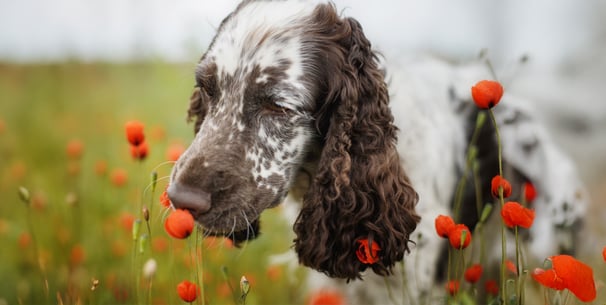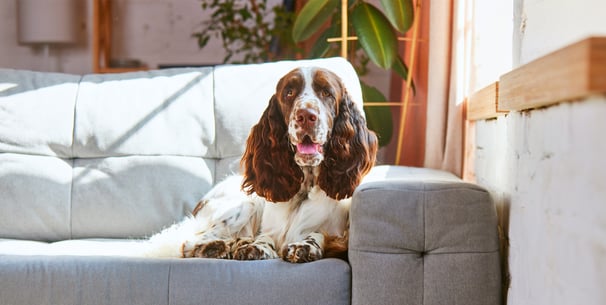Can Dogs Get Hiccups? - Unravelling the Mystery of This Common Condition
Index:



Introduction
Hiccups are repeated involuntary spasms of the diaphragm that can’t be controlled. The diaphragm plays a vital role in breathing patterns and separates the chest from the stomach. The sudden movement in the diaphragm muscles causes the vocal cords to close and a ‘hic’ sound to be produced.
Though you may feel concerned when your dog gets hiccups, it’s completely normal - dogs get hiccups just like us. Dog hiccups happen when they swallow too much air, eat or drink too fast, or feel stressed or excited amongst many other things.
Though hiccups are usually harmless and caused by too much excitement in puppies, they can be a sign of a more serious condition in rare cases so it’s best to be clued up and know the facts.
In this article we’re going to discuss:
Can dogs get hiccups?
Why do dogs get hiccups?
What to do when my puppy keeps getting hiccups?
How to prevent dog hiccups
Can dogs get hiccups?



Yes, dogs can get hiccups. But what makes them different from human hiccups?
In actual fact, nothing much. Dog hiccups, or canine hiccups, happen the same way human hiccups happen, due to involuntary movements and contractions of the diaphragm. However, while we can suffer from hiccups at any point in our lives, dogs only tend to get hiccups as puppies and seem to grow out of them by around 6 months old.
No one really knows what causes dog hiccups though some vets speculate that it’s due to gulping air during times of excitement and stress or when eating. Others suggest it is a developmental function as puppies begin to grow into adult dogs.
Hiccups in dogs tend to last around 10 to 15 minutes before they go away. If your dog is hiccupping for over an hour and is struggling to breathe, contact a vet immediately.
Why do dogs get hiccups?



There isn’t just one cause, dogs get hiccups for many reasons! Let’s take a look at the most common causes:
Swallowing air while eating or drinking
If your pup is eating or drinking water far quicker than usual, they’re more than likely going to swallow air. This intake of air, along with consuming large amounts of water, is known as aerophagia and irritates the diaphragm causing it to contract.
Excitement or anxiety
Overexcitement and anxiety can be key causes of hiccups in dogs. This is because the heart rate increases and cortisol levels rise thus resulting in an irritated diaphragm and hiccups. During times of stress or excitement dogs breathe using their chest cavity instead of their diaphragm which can cause further irritation.
Gastrointestinal issues
Health issues like gastrointestinal problems are another possible cause of hiccups in dogs. This can happen due to food intolerances. Because the stomach is close to the diaphragm, it can lead to spasms if the stomach is uncomfortable.
Changes in temperature
A rapid temperature change can lead to hiccups. This is because of a sudden disturbance to the nerve pathways from the brain to the breathing muscles. Alternatively, temperature changes in the stomach can also cause a momentary blockage of air intake leading to doggie hiccups.
Other possible causes



There are also lots of underlying health-related causes of dog hiccups such as pneumonia, bronchitis, oesophagal tumours, respiratory infections, heatstroke, and asthma, which are types of respiratory issues.
However, these conditions are often accompanied by various symptoms such as lethargy, vomiting, coughing, and lack of appetite. As always, if you notice any of the above, seek veterinary attention.
What to do when my puppy keeps getting hiccups?
Hiccups are a normal part of puppy development for about 6 months so it’s best not to panic when you notice them.
Though no one knows why they really happen, some suggest that because puppies have weaker muscles, it makes them more susceptible to muscle contractions that older dogs don’t experience.
The best thing to do during a hiccup episode is to provide comfort to your dog. Though puppy hiccups seem cute, we all know how irritating they can quickly become. While we humans can try to get rid of them by ourselves, dogs cannot - therefore, we have to help them as best we can.
This includes making sure they have a water bowl available nearby and encouraging them to take a drink. Keeping your dog as calm as possible for a couple of minutes will help them to breathe more slowly and avoid further irritation to the diaphragm.
Rubbing their tummy whilst they lay on their back can help hiccups to subside.
During a bout of hiccups, it’s important not to overfeed your dog as further eating can cause them to take more breaths ultimately leading to continued diaphragm irritation and more hiccups (something no one wants).
If prolonged hiccups or intractable hiccups persist for longer than an hour and/or other symptoms appear, consult with your veterinarian to rule out any serious problems.
How to prevent dog hiccups



The best way to prevent dog hiccups is to avoid overfeeding. Overfeeding often leads to gulping and taking in air which, in turn, leads to an episode of irritating hiccups. Regulating your dog’s food intake is crucial.
Providing a calm environment for your dog to eat and drink will prevent them from overeating. Encouraging slow eating through a slow-feeder bowl is the best way to ensure they’re eating carefully and at a pace that suits them and their body.
Making sure your dog has access to water and is hydrated will also reduce the chance of them gulping down water. Another top tip to prevent dog hiccups is to maintain regular light exercise to keep muscles strong. However, be cautious not to overdo it as exercise intolerance can also contribute to hiccups by affecting the breathing process, breathing rate, and normal breathing pattern.
Conclusion



You may notice your puppy gets hiccups when playing with other dogs, seeing their favourite humans, after they eat and drink too quickly, or when at the vet's (at a time of stress).
Understanding conditions such as hiccuping in dogs is an important part of pet ownership and can help you to be more prepared and aware, especially with the more confusing issues such as phantom pregnancies. Though puppy hiccups are undeniably cute and usually nothing to worry about - they can be an indication of a more serious problem.
If your puppy is hiccuping for long periods of time (longer than 15 minutes) and has begun to develop other symptoms such as lethargy and vomiting, we recommend consulting with your vet. If you’re a Waggel member, you can access 24/7 online vet care with Joii.
If you notice your puppy frequently hiccuping, the good news is that this usually stops after 6 months. Taking proactive steps such as providing your dog with a slow-feeding bowl and making sure they have access to water will help them to avoid experiencing hiccups at all.
The best thing to do is not to panic and keep calm - if in doubt, contact your vet.
Just got a puppy and need some help? Check out other articles on our blog such as what to do when your puppy is breathing fast, advice on puppy teething toys, exercise and walking, fishy breath in dogs and the best grain-free food.
Waggel Pet Insurance
Need more help? You're in luck if you're a Waggel Pet Insurance member. Along with our excellent coverage, we offer access to a 24/7 online vet to answer all your sticky questions, especially if you need grooming assistance.
Not a member? Why not get a quote now and cover your furry friend for a range of illnesses, all while enjoying our amazing perks and rewards.
Want more like this?
Get updates from us with helpful info, advice, answers to frequently asked questions and much more.
Index:
Related posts:
Get your quote
Along with our excellent coverage, we offer access to a 24/7 online vet to answer all your sticky questions.





